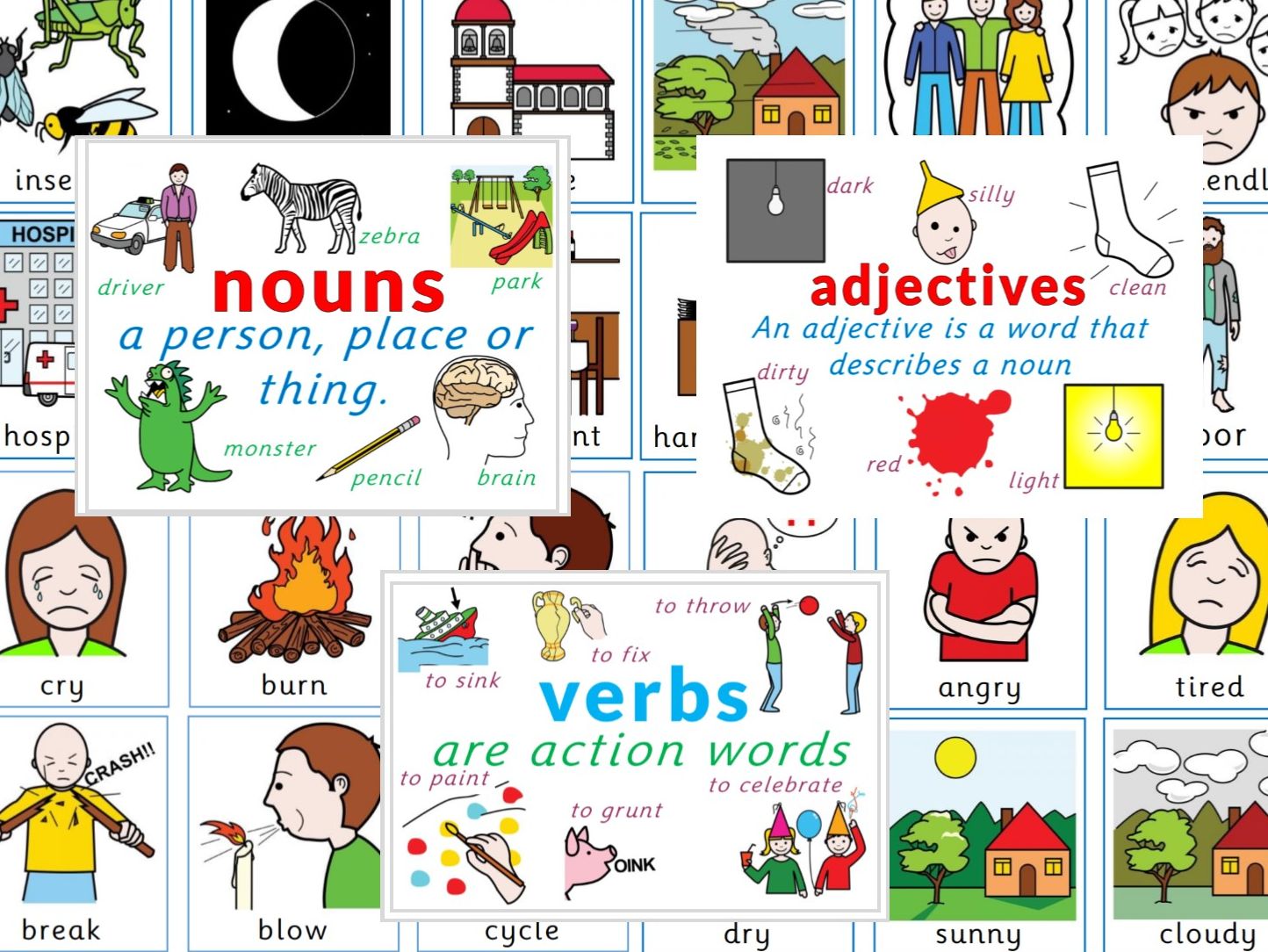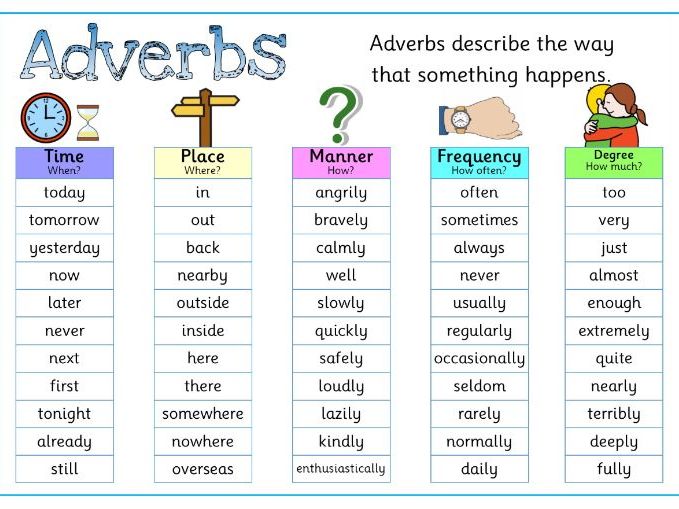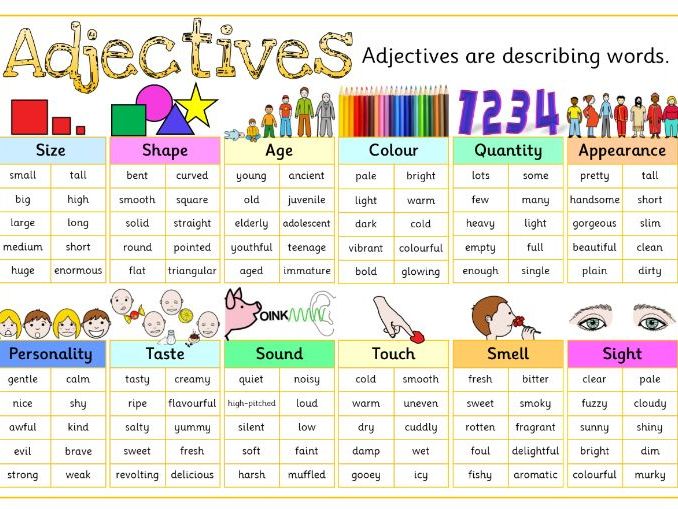398Uploads
1755k+Views
2404k+Downloads
Languages
Sale

Fronted Adverbials Mat
Fronted Adverbials Word Mat.
“Fronted Adverbials are words or phrases at the beginning of a sentence which are used to describe the action that follows.
A comma is usually used after the adverbial.”
Fronted adverbials listed under time, frequency, location, manner and degree.
Bundle Sale

Phase 5, 3 & 2 Phonics Mats Bundle
Cleverly designed, ‘flippable’ phonics mats for phase 2,3 and 5.
(Also included my medial vowel table mat, and a bonus verb, noun, mat/poster resource+a huge split digraph flashcard resource)
One side has memorable clip-art images, reverse side has a word list of carefully selected example words.
Each side is laid out in the reverse order - so that when the clip-art side is printed and put back-to-back with the word list side the words are directly behind the image. This helps the learner to find the spelling pattern they are looking for as the mat is ‘flippable’.
Phonics Phase 3- Phase 5 Workbook
Phase 3 Set 1 Worksheets
Phase 3 Set 2 Worksheets
Phase 3 Set 3 Worksheets
Phase 3 Partner Activity
Bundle Sale

Parts of Speech Display
Verb, Nouns, Adjectives Display Bundle.
162 Word Illustration Cards.
11 verb, noun, adj Definition Posters.
Sale

Sentence Types
Yelling, telling or asking?
A sentence type resource for year 2 and year 1 with 159 illustrated telling, asking or exclamatory sentences. Learners to add end punctuation.
3 similar sentences per A4 page - 1 of each sentence type (yelling, telling or asking)
1 version with 3 very similar sentences, but which on careful reading are each different (i.e. 1 is a simple telling, 1 is exclamatory, 1 is a question sentence) (51 sentences)
1 version with 3 obviously different sentences (36 sentences) but with a the same sentence topic.
1 version as above with easier to read/decodable sentences for LA learners (21 sentences)
1 version with 3 very similar sentences but which change dependent upon the end punctuation (51 sentences)
Sale

Adverb Mats Adverb Posters
Adverb mats & adverb posters.
Differentiated adverb scaffolds. Some with more adverbs, some with less adverbs. Plus adverbs of manner place mat.
Adverb mats are A4. Adverb posters are A3.
Sale

Adjectives Mats
Adjectives mats & adjectives posters.
Differentiated adjective scaffolds - one with many adjectives, one with less and larger font.
Adjective mats are A4. Adjective posters are A3.
Also uploaded the publisher file if you wish to edit the example words (the font used is Topmarks )
Bundle Sale

Split Digraph
Split Digraphs
Phase 5 Split Digraph Bundle
e_e i_e o_e a_e u_e
Worksheets, Flashcards, Matching Games
Sale

Formal / Informal English
Formal and Informal English Learning Materials
These materials consist of 3 sets of worksheets and flashcards to help primary school students learn the difference between formal and informal English.
Worksheet Activities (3 levels):
Students practice formalizing informal phrases and matching formal and informal equivalents.
• Transform colloquial expressions into formal language
• Write out formal versions of informal phrases
• Match informal phrases to their formal counterparts
Flashcard Activities:
Sets of formal and informal phrase flashcards for matching and speaking practice.
Students match informal cards with their formal counterparts and vice versa.
Flashcards can also be used for speaking and role-play activities where students practice changing between formal and informal language.
The activities are designed to:
• Develop vocabulary around formal vs informal language
• Foster an awareness of context and audience in language choice
• Provide differentiated practice to suit a range of learning levels
Sale

Fables Reading Comprehension A
Carefully curated collection of 26 classic fables, designed to enrich your students’ reading comprehension skills. Each fable has been thoughtfully written to conform to the traditional short length of fables, making them easily digestible for young readers. Additionally, 5-7 comprehension questions are provided below each fable, allowing for a thorough understanding of the text.
The collection includes beloved tales such as “The North Wind and the Sun,” “The Goose and the Golden Eggs,” “The Tortoise and the Eagle,” and “The Ant and the Dove,” among others. Answer sheets are also included for each fable to facilitate easy marking.
This product is an excellent resource for teachers who wish to engage their students in meaningful discussions about important life lessons, such as perseverance, hard work, and empathy. With this collection of timeless fables, your students will learn valuable lessons while also improving their reading comprehension skills.
Furthermore, a link to a Google slide is provided, featuring each fable on one page for whole-class reading.
Full list of included fables:
The North Wind and the Sun
The Goose and the Golden Eggs
The Fox and the Grapes
The Eagle and the Rabbits
The Fox without a Tail
The Caged Bird and the Bat
The Frogs Choose a King
The Goat and the Wolf
The Rabbits and the Frogs
The Thrush and the Jay
The Tortoise and the Eagle
The Two Stubborn Goats
A Swallow and a Spider
An Ant and a Pigeon
The Ant and the Dove
The Bundle of Sticks
The Fox, The Grapes and The Berries
The Cat and the Mice
The Crab and His Mother
The Dog and the Egg
The Dog and the Wolf
The Dog, the Cockerel, and the Fox
The Donkey and the Shepherd
The Donkey Carrying the Statue
The Donkey in the Lion’s Skin
The Donkey, the Fox, and the Lion
Sale

Fables Reading Comprehension B
A carefully curated collection of 29 classic fables, designed to enhance your students’ reading comprehension skills. Each fable has been thoughtfully written to conform to the traditional short length of fables, making them easily readable for young readers. In addition, 5-7 comprehension questions are provided below each fable to encourage a deep understanding of the text.
The collection encompasses beloved tales such as “The Lion and the Mouse,” “The Ant and the Grasshopper,” “The Wolf and The Crane,” “Belling the Cat,” and “A Peacock and a Crane,” along with 24 other timeless fables.
Answer sheets are also included for each fable, making it easier to mark.
This product is an excellent resource for teachers who want to engage their students in meaningful discussions about important life lessons, such as perseverance, hard work, and empathy. With this collection of fables, your students will learn valuable lessons while also improving their reading comprehension skills.
Moreover, a link to a Google slide is provided, featuring each fable on one page for whole-class reading.
Full list of included fables:
Wolf and Crane (2 levels)
Lion and Mouse (3 levels)
Boy Who Cried Wolf (2 levels)
Ant and Grasshopper (3 levels)
The Hornets and the Bees
The Greedy Fox
The Fox, the Rooster and the Dog
The Fox and the Woodcutter
The Fox and the Goat
The Farmer and the Stork
The Donkey and the Lap Dog
The Donkey and the Dog
The Discontented Dog
The Cat and the Fox
The Bear and the Bees
Belling the Cat
An Oak and a Willow
A Peacock and a Crane
The Wolf and the Lion
The Wolf and the Lamb
The Wild Boar and the Fox
The Turtle and the Ducks
The Pig and the Sheep
The Miser’s Gold
The Man and the Lion
The Lion, the Fox, and the Donkey
The Lion, the Bear, and the Fox
The Lion and the Boar
The Hunting Dog, the Lion, and the Fox
Bundle Sale

Reading Comprehension Mega Bundle
Reading comprehension mega pack of 84 fables, available as a bundle download at great value. This pack includes all the most famous classic fables such as “The Hare and the Tortoise,” “The Fox and the Stork,” and “The Lion and the Mouse.” and many, many more.
Each fable comes with an answer sheet and is easy to print on one A4 page.
Plus, many fables are differentiated at three levels to accommodate different reading comprehension abilities.
Don’t miss out on this comprehensive resource for improving reading comprehension skills.
Bundle Sale

Fables Reading A&B Bundle
Enhance reading comprehension skills with this bundle of classic fables from fables packs A&B.
It includes 55 fables, offering great value, and features timeless tales such as “The Lion and the Mouse,” “The Ant and the Grasshopper,” “The Wolf and The Crane,” “The North Wind and the Sun,” and “The Goose and the Golden Eggs.” and many more.
Each fable comes with an answer sheet and is easy to print on one A4 page.
Plus, many fables are differentiated at three levels to accommodate different reading comprehension abilities.
Don’t miss out on this comprehensive resource for improving reading comprehension.
Bundle Sale

Fables Reading B&C Bundle
Enhance reading comprehension skills with this bundle of classic fables from fables packs B&C.
It includes 57 fables, offering great value, and features timeless tales such as “Hare and the Tortoise,” “The Fox and the Stork,” “The Crow and the Pitcher,” “The Town Mouse and Country Mouse,” “The Wolf in Sheep’s Clothing,” “The Lion and the Mouse,” “The Ant and the Grasshopper,” “The Wolf and The Crane,” “Belling the Cat,” and “A Peacock and a Crane,” and many more.
Each fable comes with an answer sheet and is easy to print on one A4 page.
Plus, many fables are differentiated at three levels to accommodate different reading comprehension abilities.
Don’t miss out on this comprehensive resource for improving reading comprehension.
Sale

Lion and Mouse Fable
Differentiated reading comprehension fable retellings of Aesop’s ‘The Lion and the Mouse’
These differentiated retellings of Aesop’s “The Lion and the Mouse” offers three levels of complexity (higher, middle, and lower), students of all abilities can engage with the text and develop their skills. The higher level includes more advanced vocabulary and ten in-depth comprehension questions, while the middle level offers simpler synonyms and nine questions. The lower level is the easiest to read, with a shorter text and seven questions. All levels come with a handy answer key.
Sale

Fables Reading Comprehension C
Another carefully curated collection of 28 classic fables, designed to enhance your students’ reading comprehension skills. Each fable has been thoughtfully written to conform to the traditional short length of fables, making them easily readable for young readers. In addition, 5-7 comprehension questions are provided below each fable to encourage a deep understanding of the text.
The collection encompasses beloved tales such as “Hare and the Tortoise,” “The Fox and the Stork,” “The Crow and the Pitcher,” “The Town Mouse and Country Mouse,” and “The Wolf in Sheep’s Clothing,” along with 23 other timeless fables.
Answer sheets are also included for each fable, making it easier to mark.
This product is an excellent resource for teachers who want to engage their students in meaningful discussions about important life lessons, such as perseverance, hard work, and empathy. With this collection of fables, your students will learn valuable lessons while also improving their reading comprehension skills.
Moreover, a link to a Google slide is provided, featuring each fable on one page for whole-class reading.
Fables in this pack:
Hare and the Tortoise (5 levels)
The Fox and the Stork (2 levels)
The Bat and the Weasels
The Boys and the Frogs
The Crow and the Pitcher
The Farmer and His Sons
The Fly and the Lion
The Fox and the Leopard
The Fox and the Rose Bush
The Lion and the Bulls
The Lion and the Donkey
The Lion and the Hare
The Monkey and the Camel
The Monkey as King
The Mosquito and the Bull
The Old Lion
The Ox and the Frog
The Proud Lion and the Donkey
The Stag at the Pool
The Tame Donkey and the Wild Donkey
The Town Mouse and Country Mouse
The Vain Jackdaw and His Borrowed Feathers
The Wolf and His Shadow
The Wolf and the Goat
The Wolf in Sheep’s Clothing
A Fox and a Raven
A Mountain and a Mouse
An Eagle and other Birds
Sale

Little Red Riding Hood
Differentiated reading comprehension worksheets for the classic fairytale Little Red Riding Hood
This carefully re-told story is written at three levels appropriate for readers aged from 6 to 11 years old.
The higher level text is double-sided, has a larger word count and features more complex vocabulary and includes 17 questions, including vocabulary questions.
The middle level is double-sided, has simpler vocabulary and comes with two question sheet versions; one with 15 questions, another with 8 questions.
The lower level text has been simplified for lower-level readers, but follows the structure of the other two higher texts and is therefore also double-sided but uses mainly decodable and high frequency words and has only 7 essential comprehension questions using easy to read and answer questions.
All levels come with answer sheets.
More fairy tale reading worksheets:
Hansel and Gretel
Rapunzel
Thumbelina
The Ugly Duckling
Sale

Jack and the Beanstalk
Differentiated reading comprehension worksheets for the classic fairytale ‘Jack and the Beanstalk’.
This carefully retold story is written at three levels appropriate for readers aged from 6 to 11 years old.
The higher level text is double sided, has a larger word count and features more ambitious vocabulary and includes 16 questions, including vocabulary questions.
The middle level is double sided, has fewer and easier to comprehend words and comes with two question sheet versions; one with 14 questions, another with 10 questions.
The lower level text has been simplified for lower-level readers, but follows the structure of the other two higher texts and is therefore also double sided but uses mainly decodable and high frequency words and has 9 comprehension question using easy to read and answer questions.
All levels come with answer sheets.
Looking for other classic fairy tale reading worksheets?
Little Red Riding Hood
Hansel and Gretel
Snow White and the Seven Dwarfs
Rapunzel
And many more reading printables in my shop!
Sale

Rumpelstiltskin Reading Comprehension
Differentiated reading comprehension worksheets for the fairytale ‘Rumpelstiltskin’ at four levels appropriate for readers aged 6 to 11 years old.
The higher level text is double-sided, has a larger word count, features more complex vocabulary, and includes 18 higher level comprehension questions.
The middle level text is double-sided, has simpler vocabulary, and includes 13 comprehension questions.
There are two lower level texts, both of which have been simplified for lower-level readers and follow the structure of the higher level texts. However, one is a shortened version omitting one night of spinning straw into gold in exchange for a ring. Both lower level texts use mainly decodable and high frequency words. The lower level full story version has 11 comprehension questions, and the shortened version has 9 comprehension questions that are easy to read and answer.
All levels come with answer sheets.
More Brothers Grimm reading worksheets:
Cinderella
Snow White
Hansel and Gretel
Bremen Town Musicians
Sale

The Fisherman and His Wife
Differentiated reading comprehension worksheets for the fairytale ‘The Fisherman and His Wife,’ which tells the story of a fisherman who catches a magical fish that grants wishes. However, his wife’s greed leads to their downfall, teaching the moral to be content with what you have and not be greedy for more.
The carefully retold story is written at four levels appropriate for readers aged 6 to 11 years old.
The higher level text is double-sided, has a larger word count, features more complex vocabulary, and includes 17 higher level questions.
The middle level text is double-sided, has simpler vocabulary, and includes 13 questions.
There are two lower level texts, both of which have been simplified for lower-level readers and follow the structure of the higher texts. However, one is a shortened version omitting one of the wife’s three wishes. Both lower level texts use mainly decodable and high frequency words. The full version has nine questions, and the shortened version has nine easy-to-read and answer questions.
All four levels come with answer sheets.
Looking for other anti-fairy tales?
The Swineherd by Hans Christian Andersen
Puss in Boots
The Emperor’s New Clothes




















